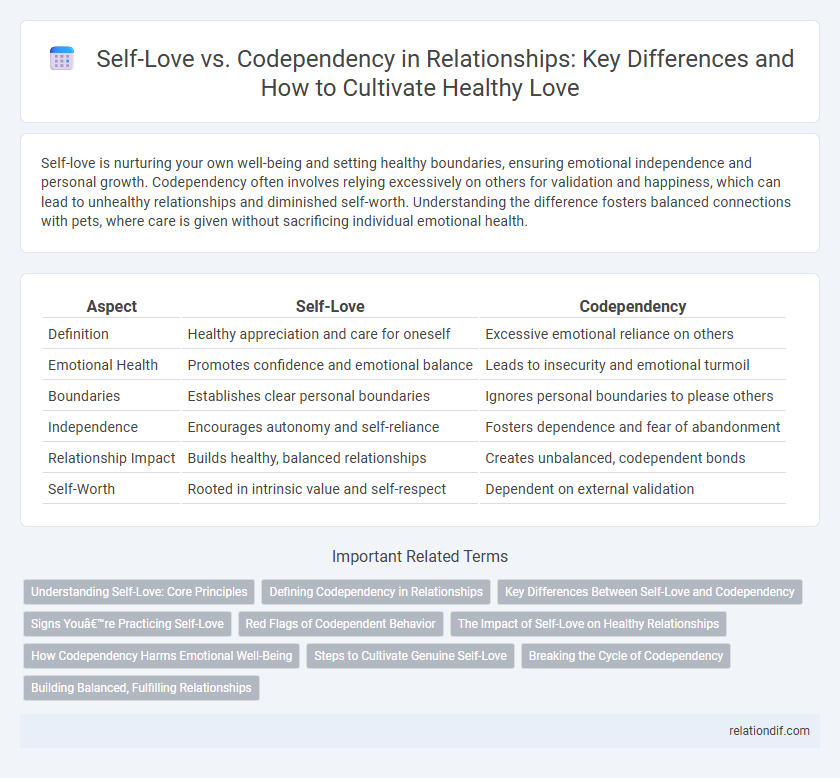Self-love is nurturing your own well-being and setting healthy boundaries, ensuring emotional independence and personal growth. Codependency often involves relying excessively on others for validation and happiness, which can lead to unhealthy relationships and diminished self-worth. Understanding the difference fosters balanced connections with pets, where care is given without sacrificing individual emotional health.
Table of Comparison
| Aspect | Self-Love | Codependency |
|---|---|---|
| Definition | Healthy appreciation and care for oneself | Excessive emotional reliance on others |
| Emotional Health | Promotes confidence and emotional balance | Leads to insecurity and emotional turmoil |
| Boundaries | Establishes clear personal boundaries | Ignores personal boundaries to please others |
| Independence | Encourages autonomy and self-reliance | Fosters dependence and fear of abandonment |
| Relationship Impact | Builds healthy, balanced relationships | Creates unbalanced, codependent bonds |
| Self-Worth | Rooted in intrinsic value and self-respect | Dependent on external validation |
Understanding Self-Love: Core Principles
Self-love involves recognizing one's intrinsic worth and setting healthy boundaries to nurture emotional well-being, while codependency often blurs these boundaries by relying on others for validation. Core principles of self-love include self-awareness, self-acceptance, and self-care, which empower individuals to maintain autonomy and emotional balance. Understanding these fundamentals helps differentiate genuine self-love from unhealthy dependency patterns in relationships.
Defining Codependency in Relationships
Codependency in relationships is characterized by an excessive emotional or psychological reliance on a partner, where one's self-worth and identity become intertwined with the other person's needs and approval. This dynamic often leads to unhealthy patterns of enabling, neglecting personal boundaries, and sacrificing individual well-being for the sake of maintaining the relationship. Understanding codependency involves recognizing these imbalanced dependencies that hinder genuine self-love and personal growth.
Key Differences Between Self-Love and Codependency
Self-love involves maintaining healthy boundaries, nurturing personal growth, and prioritizing one's well-being, whereas codependency is characterized by excessive reliance on others for validation and self-worth. Self-love fosters emotional independence and resilience, while codependency often leads to enabling behaviors and emotional exhaustion. Understanding these distinctions is crucial for cultivating balanced relationships and mental health.
Signs You’re Practicing Self-Love
Recognizing signs of practicing self-love includes setting healthy boundaries, prioritizing personal well-being, and maintaining emotional independence without relying on others for validation. Consistently engaging in self-care routines, acknowledging your worth, and making decisions aligned with your values reflect genuine self-love rather than codependent behaviors. Empowerment through self-respect and self-awareness promotes balanced relationships and emotional resilience.
Red Flags of Codependent Behavior
Recognizing red flags of codependent behavior includes an excessive need for approval, difficulty setting personal boundaries, and a tendency to prioritize others' needs over one's own well-being. Codependency often manifests through low self-esteem, emotional dependence on others for validation, and an inability to function independently in relationships. Cultivating self-love involves fostering self-respect, autonomy, and healthy emotional boundaries to break free from the cycle of codependency.
The Impact of Self-Love on Healthy Relationships
Self-love cultivates emotional independence, empowering individuals to establish healthy boundaries and avoid codependency in relationships. Embracing self-worth enhances communication and mutual respect, creating a balanced dynamic where both partners thrive. Prioritizing personal growth through self-love directly influences relationship satisfaction and long-term stability.
How Codependency Harms Emotional Well-Being
Codependency undermines emotional well-being by fostering excessive reliance on others for validation, which diminishes self-worth and personal boundaries. It often leads to chronic stress, anxiety, and difficulty in establishing healthy relationships, impairing emotional resilience. Prioritizing self-love boosts autonomy, self-respect, and emotional stability, counteracting the harmful patterns of codependency.
Steps to Cultivate Genuine Self-Love
Cultivating genuine self-love involves setting clear boundaries to prioritize your emotional well-being and recognizing patterns of codependency that undermine personal growth. Practicing mindfulness and self-compassion allows for a deeper awareness of your intrinsic worth beyond external validation. Consistent reflection and intentional self-care routines reinforce a healthy, autonomous sense of love rooted in self-respect and empowerment.
Breaking the Cycle of Codependency
Breaking the cycle of codependency requires embracing self-love by setting healthy boundaries and prioritizing one's emotional well-being. Developing self-awareness helps identify codependent patterns such as excessive people-pleasing and loss of personal identity. Cultivating self-worth and independence fosters healthier relationships based on mutual respect rather than dependency.
Building Balanced, Fulfilling Relationships
Building balanced, fulfilling relationships requires cultivating self-love that fosters emotional independence and personal growth. Codependency often undermines this balance by creating reliance on others for validation and self-worth. Prioritizing self-awareness and healthy boundaries enhances mutual respect and supports sustainable connection.
Self-Love vs Codependency Infographic

 relationdif.com
relationdif.com